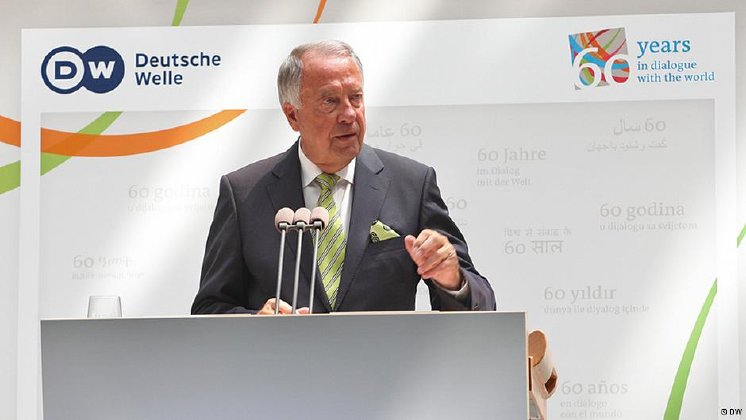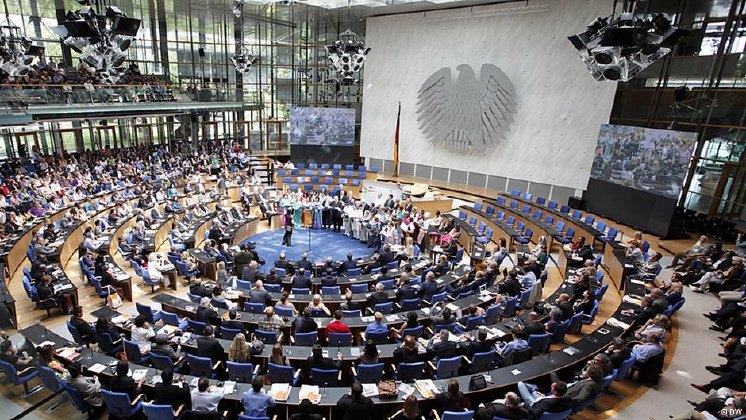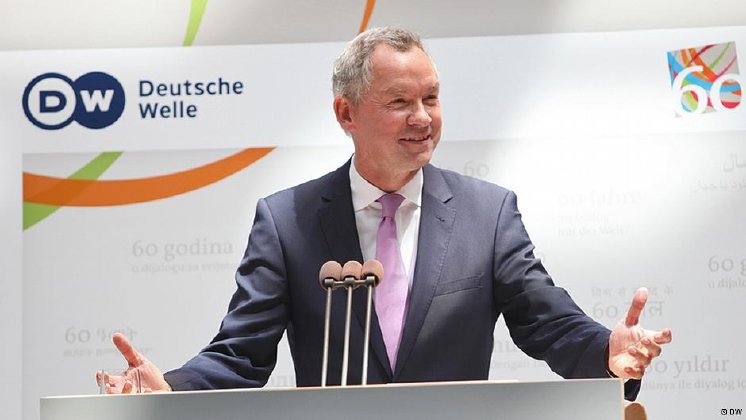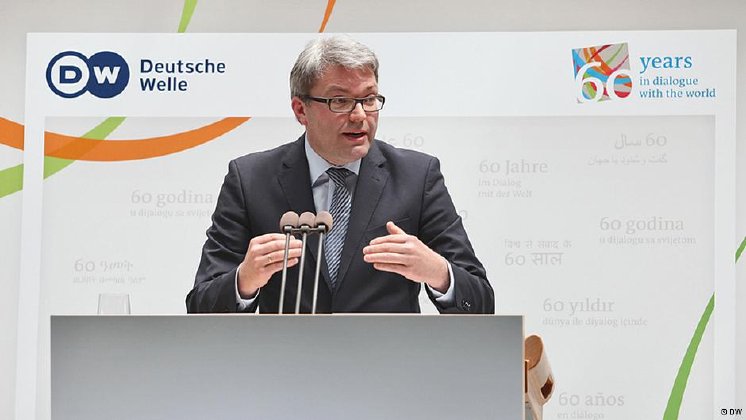Bernd Neumann, Germany's Federal Commissioner for Culture and the Media, said in his ceremonial address that, for many people living in unfree societies, Deutsche Welle is "a primary source of information when it comes to forming their own opinions about current affairs without being influenced by the state." Deutsche Welle, he added, "does not just convey universal values like freedom and human rights, but has also always built bridges between cultures. The high esteem our country now enjoys around the world is also a result of this work. Deutsche Welle is Germany's media calling card in the world."
In order to continue to be a strong player in the growing competition within international media markets, Germany needs "an independent, self-assured and well-positioned international broadcaster - and that is Deutsche Welle," Neumann said in Bonn. He attested to DW's continuing capacity for innovation, having developed from a shortwave broadcaster to a successful multimedia organization.
The minister of state used the ceremony commemorating DW's 60th anniversary as an occasion to affirm the funding guarantee that the Deutsche Welle Act provides for an independent international broadcaster. "This will also be the case in the future," Neumann said.
The plenary chamber was full for the opening of the Global Media Forum 2013 in Bonn
In addition, Neumann referred to the expansion of Deutsche Welle's cooperation with Germany's domestic public broadcasters including ARD (Association of Public Broadcasting Corporations in Germany), ZDF and Deutschlandradio as a way to continue synergizing more effectively while ensuring a solid footing for the international broadcaster in the future. Thanks to a decision reached jointly by Germany's state government leaders and Chancellor Angela Merkel on June 13, Neumann believes these goals are now "one step closer."
DW Director General Erik Betterman said that the decision is "a milestone for Germany's media policy. And the decision is certainly an important step towards securing Deutsche Welle's future." Bettermann emphasized DW's lasting importance, especially in the face of the "establishment of new international broadcasters." He said that more and more competitors are taking part in "a battle for international public interest," which, according to Bettermann, is a competition about values and ideas. According to the DW director general, Deutsche Welle conveys the "values that Germany and Europe stand for: freedom, democracy and human rights." In many countries the pillars of Western society are "no longer self-evident truths," he said.
Bettermann pointed out, that "the widespread interest and favor that Germany receives in many regions around the world is an opportunity for our country, and one that we should make use of." Deutsche Welle is well set up for "the challenges of the future" thanks to a range of far-reaching reforms to DW programming and overall structure that were carried out in the last few years, Bettermann added. The political decision to further integrate Deutsche Welle into the German media system came at the perfect moment, according to the director general. He described DW as a "unique jewel" in Germany's media landscape.
Lutz Marmor
The ARD Chairman Lutz Marmor, who is also the director general of NDR (North German Broadcasting), congratulated DW on behalf of ARD. In reference to the federal and state governments' decision of June 13, he said: "The decision has paved the way for the future. Now we just have to breathe life into what we've put on paper." Marmor added that the agreement will allow DW to "internationally represent Germany even more effectively" and to show the world the best ARD, ZDF and Deutschlandradio have to offer. Expanding the cooperation between DW and Germany's domestic public broadcasters will allow for what he called "Deutsche Welle reloaded."
Marc Jan Eumann
Marc Jan Eumann, the State Secretary for Media of the German State of North Rhine-Westphalia, emphasized that "North Rhine-Westphalia recognizes the importance of Deutsche Welle," which has its headquarters in Bonn. He pointed out that a tax-funded, yet independent broadcaster needs "strong and pluralistic supervisory bodies." He thanked the Broadcasting Board and the Administrative Board for taking on this important task.
Partners and supporters
Over 2500 guests from all over the world have registered to attend the three-day Deutsche Welle Global Media Forum in the World Conference Center (WCCB) in Bonn. Around 50 workshops and plenary sessions are organized in cooperation with many of DW's partners.
The 2013 Deutsche Welle Global Media Forum is co-hosted by the Foundation for International Dialogue of the Sparkasse in Bonn. It is supported by Germany's Federal Foreign Office, the Federal Ministry for Economic Cooperation and Development (BMZ), the European Regional Development Fund, the Minister for Federal Affairs, Europe and the Media in the German state of North Rhine-Westphalia, as well as by the City of Bonn. The North Rhine-Westphalian Foundation for Environment and Development is a cooperation partner.
The Main Events as a Livestream
Deutsche Welle is providing a Livestream of the main events of the Global Media Forum at http://www.techcast.com/.... This includes not only the celebration of Deutsche Welle's 60th anniversary, but also the keynote speech of globalisation critic professor Noam Chomsky on Monday, June 17 (5.30 p.m. - 6.15 p.m. CEST). The highlights on Tuesday available as a Livestream will include the keynote speech given by German Federal Minister for Foreign Affairs Guido Westerwelle, followed by a discussion (10.30 a.m. - 11.15 a.m. CEST), and the awards ceremony for "The Bobs - Best of Online Activism" (5.30 p.m. - 6.30 p.m. CEST). On Wednesday, June 19, users can stream the keynote speech of Indian human rights activist Vandana Shiva (1 p.m. - 1.45 p.m. CEST).
Representatives of the Press can sign up at the WCCB in Bonn.





